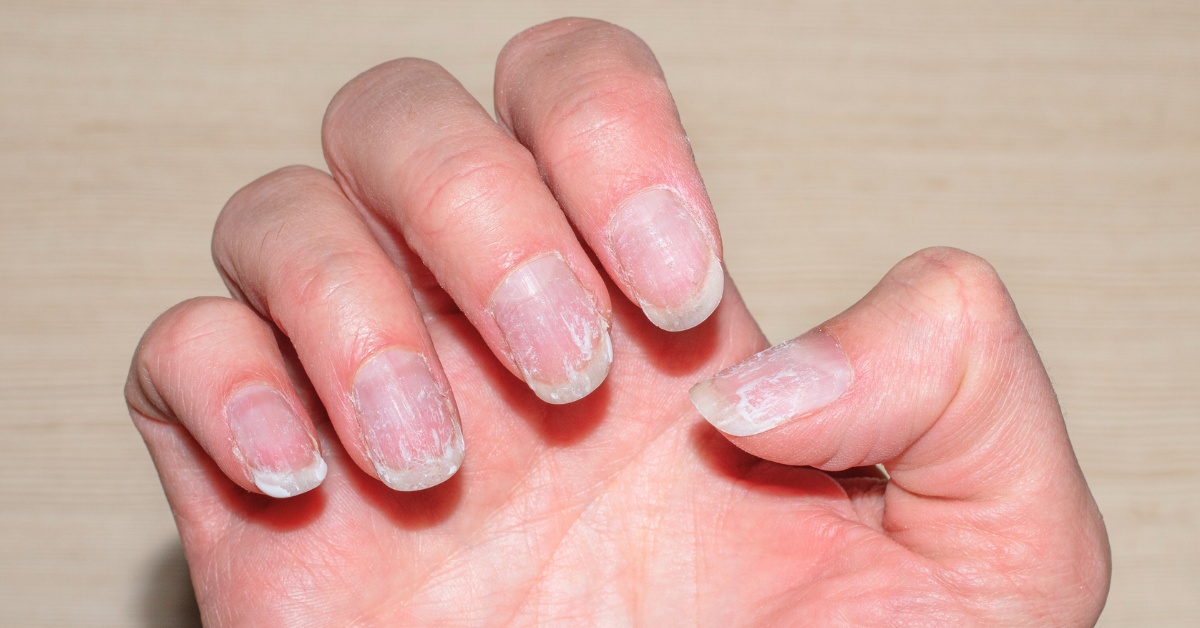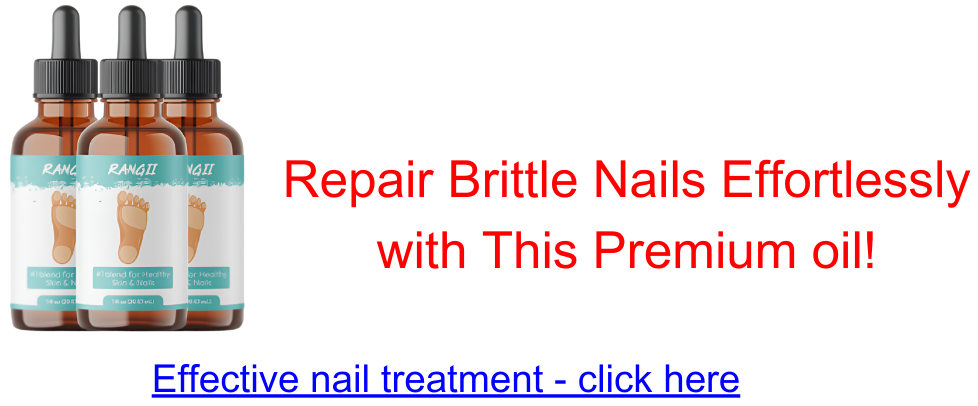Why are my toenails brittle? Causes, treatment and nutrition

Brittle toenails can be a source of discomfort and self-consciousness, affecting not only the appearance but also the overall health of your feet. Whether you’re dealing with yellow, thick, dry, splitting, or crumbling nails, understanding the underlying causes and effective treatment options is crucial for regaining confidence in your feet’s appearance and health.
Causes of Brittle Toenails
Brittle toenails can stem from various factors, ranging from medical conditions to lifestyle choices. Understanding the root cause is the first step toward finding an appropriate treatment.
Here are some common reasons why toenails may become brittle, each explained in more detail to provide a deeper understanding for the reader:
- Hypothyroidism: When the thyroid gland doesn’t produce enough hormones, it can lead to brittle nails, among other symptoms like weight gain and fatigue. The thyroid plays a crucial role in regulating metabolism, and its dysfunction can affect various bodily functions, including nail health. Brittle nails in individuals with hypothyroidism often accompany other signs of thyroid dysfunction, making it important to consider this condition as a potential cause.
- Nutritional Deficiencies: Nails require a balanced intake of essential nutrients to stay strong and healthy. Deficiencies in vitamins and minerals, such as biotin, vitamin C, iron, and zinc, can weaken nails and contribute to brittleness. Conditions like bulimia, anorexia, and anemia, which involve inadequate nutrient intake or absorption, can deprive the body of vital nutrients necessary for nail health. Understanding the role of nutrition in maintaining strong nails underscores the importance of a well-rounded diet for overall nail health.
- Overuse of Chemical Products: Excessive exposure to nail polish, polish removers, and cuticle solvents can strip the nails of moisture and essential oils, leading to brittleness. Individuals working in nail salons or frequently changing nail colors may be particularly susceptible to this type of damage. Harsh chemicals can weaken the structure of the nails, making them prone to splitting, peeling, and breakage. Proper protection and moderation in the use of chemical products are essential for preserving nail health.
- Excessive Moisture or Dryness: Paradoxically, both too little and too much moisture can contribute to brittle toenails. Constant exposure to water, as experienced by swimmers, lifeguards, or individuals with occupations involving water immersion, can weaken the nails and make them prone to brittleness. Conversely, frequent exposure to strong soaps or over washing can strip the nails of natural oils, leading to dryness and brittleness. Maintaining a balanced level of moisture through proper hydration and moisturization is key to preventing nail brittleness.
- Aging: As we age, our bodies undergo various changes, including a decreased ability to retain moisture. This natural aging process can affect the health and appearance of the nails, making them dry, brittle, and more susceptible to damage. Understanding the impact of aging on nail health emphasizes the importance of proactive care and maintenance as we grow older.
- Fungal Infections: Toenail fungus, also known as onychomycosis, is a common fungal infection that can affect the health of the nails. Fungal infections weaken the nails, causing them to become discolored, thickened, and brittle. Yellow, thick, and crumbly toenails are common signs of toenail fungus, which can be challenging to treat without proper intervention. Recognizing the symptoms of fungal infections and seeking timely treatment is essential for preventing further damage to the nails.
- Other Medical Conditions: Certain medical conditions, such as Raynaud’s Phenomenon, psoriasis, eczema, and other skin conditions, can impact nail health and contribute to brittleness. These conditions may affect blood flow, skin integrity, or immune function, leading to changes in the nails’ appearance and texture. Understanding the relationship between underlying medical conditions and nail health is crucial for identifying and addressing the root cause of brittle toenails.
Treatment Options
Fortunately, several treatment options are available to address brittle toenails and restore their strength and appearance.
Here are some effective treatments for brittle toenails, presented with the user in mind to ensure clarity and practicality:
- Biotin Supplements: Biotin, a B-complex vitamin, has been found to strengthen weak, brittle nails. Over-the-counter biotin supplements, such as Appearex, can be easily incorporated into your daily routine. Studies suggest that taking a daily dose of 2.5 milligrams of biotin can significantly improve nail strength over time. By adding biotin supplements to your diet, you can support your nails’ health from within and promote stronger, more resilient nails.
- Genadur: For individuals seeking a prescription treatment for brittle nails, Genadur offers a promising solution. Approved by the FDA, Genadur is specifically designed to address fragile, brittle nails. Its once-daily brush-on application makes it convenient to use, with visible results often noticeable within two to three weeks. By following the prescribed regimen, you can enhance the strength and appearance of your toenails and regain confidence in your feet’s health.
- Proper Nail Care: Adopting good hygiene and trimming habits is essential for maintaining overall nail health. Simple practices such as regular moisturizing, foot soaks, and wearing properly fitting shoes can make a significant difference in preventing nail brittleness. By keeping your toenails clean, well-moisturized, and properly trimmed, you can minimize the risk of damage and promote healthy nail growth.
- Address Underlying Health Issues: If your brittle toenails are caused by underlying medical conditions such as hypothyroidism or fungal infections, it’s crucial to address these issues with appropriate medical treatment. Consult with a healthcare professional to identify and treat any underlying health issues contributing to your nail problems. By addressing the root cause, you can effectively manage brittle toenails and prevent recurrence in the future.
- Avoid Harsh Chemicals: Limiting exposure to harsh chemicals is essential for protecting your nails from damage. Avoiding nail polish, polish removers, and other chemical products that can strip the nails of moisture and weaken their structure is important. Instead, opt for gentle, moisturizing nail care products that nourish and protect your nails. By choosing nail products with natural ingredients and avoiding harsh chemicals, you can promote healthier, stronger nails over time.
To strengthen brittle toenails through nutrition, consider incorporating these nutrient-rich foods into your diet:
- Protein-Rich Foods: Nails are made of a protein called keratin, so ensuring an adequate intake of protein is crucial for nail health. Incorporate sources of lean protein such as poultry, fish, eggs, legumes, nuts, and seeds into your meals.
- Biotin: Biotin, also known as vitamin B7, is essential for nail strength and growth. Include biotin-rich foods in your diet such as eggs, nuts (especially almonds and peanuts), seeds (such as sunflower seeds), whole grains, bananas, mushrooms, and avocado.
- Omega-3 Fatty Acids: Omega-3 fatty acids help to moisturize and strengthen nails from within. Add omega-3-rich foods like fatty fish (salmon, mackerel, sardines), flaxseeds, chia seeds, walnuts, and hemp seeds to your diet.
- Vitamin C: Vitamin C is essential for collagen production, which is important for nail strength and resilience. Incorporate vitamin C-rich foods such as citrus fruits (oranges, lemons, grapefruits), strawberries, kiwi, bell peppers, tomatoes, and broccoli into your meals.
- Iron: Iron deficiency can lead to brittle nails, so ensure you’re getting enough iron from sources such as lean meats, poultry, fish, tofu, beans, lentils, fortified cereals, spinach, and other leafy greens.
- Zinc: Zinc plays a role in nail growth and repair. Include zinc-rich foods like shellfish (oysters, crab, shrimp), lean meats, poultry, nuts, seeds, whole grains, and dairy products in your diet.
- Vitamin E: Vitamin E is an antioxidant that promotes nail health by protecting them from damage. Enjoy foods rich in vitamin E such as almonds, sunflower seeds, spinach, avocado, olive oil, and wheat germ.
Conclusion
Brittle toenails can indeed be frustrating and uncomfortable, but there’s hope for improvement with the right approach to understanding and treatment. By looking into the underlying causes and adopting proper nail care habits, you can take significant steps toward restoring the health and appearance of your nails.
Addressing the root causes of brittle toenails is essential for effective treatment. Whether it’s addressing medical conditions like hypothyroidism or fungal infections or making lifestyle changes to avoid excessive moisture or exposure to harsh chemicals, understanding the underlying factors contributing to your condition is key.
In addition to addressing the root causes, adopting proper nail care habits can greatly contribute to nail health. Simple practices such as regular moisturizing, proper trimming, and avoiding harsh chemicals can make a significant difference in preventing further damage and promoting healthy nail growth.
Considering treatment options like biotin supplements and prescription products like Genadur can also provide targeted support for strengthening and restoring brittle toenails. Biotin supplements have shown promising results in improving nail strength, while prescription products like Genadur offer FDA-approved solutions for fragile nails.
If you’re unsure about the best treatment approach for your specific condition, don’t hesitate to consult with a healthcare professional. They can provide personalized guidance and recommendations tailored to your individual needs, ensuring that you receive the most effective treatment for your brittle toenails.
With the right understanding, treatment approach, and professional guidance, you can regain confidence in your feet and enjoy healthy, resilient toenails once again. Don’t let brittle toenails hold you back—take proactive steps toward nail health and reclaim your confidence today.

Leave a Reply